18 Best Places to Visit in New Mexico, According to Locals
Come to see historic small towns, scenic hiking trails, the "Grand Canyon of New Mexico," and more.
For a true taste of the American Southwest, consider a trip to New Mexico. Spanning approximately 121,000 square miles, the state is famous for its rich Indigenous history, vast landscapes (from towering dunes to subterranean caves), amazing archaeological sites, national landmarks (cliff dwellings, well-preserved adobe buildings, and centuries-old churches, to name a few), and an incredible arts and culture scene. It’s no surprise, then, that New Mexico is nicknamed the Land of Enchantment.
To narrow down the state’s best attractions, we reached out to local experts for their top recommendations. Without further ado, here are the best places to visit in New Mexico, from sprawling national parks to tiny towns and everything in between.
White Sands National Park

Mary Robnett/Travel + Leisure
Spanning 275 square miles, White Sands National Park is the world’s largest gypsum dune field, and it looks and feels like an entirely different planet. The wave-like, powder-white sand dunes resemble mounds of snow, and visitors can hike or sled down them any time of year. It’s also worth noting the park is home to a handful of white-hued animals — which have changed to a lighter color over time to adapt to the environment — including mice, lizards, crickets, spiders, and moths.
Couse-Sharp Historic Site
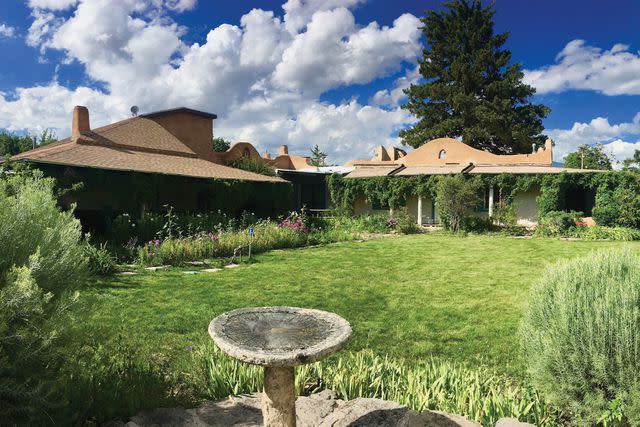
Visit New Mexico
Angelisa Murray, CEO of guided tour operator Heritage Inspirations in Taos, describes the Couse-Sharp Historic Site as a “true gem” and “one of [her] favorite museums.” Here, you’ll find the former homes and art studios of Taos Society of Artists (TSA) founding members Joseph Sharp and E.I. Couse. “Our guests can see the actual moccasins and pottery that Couse painted in his paintings ... and journey back in time to get a real feel of Taos in the early 1900s,” says Murray.
Abiquiú
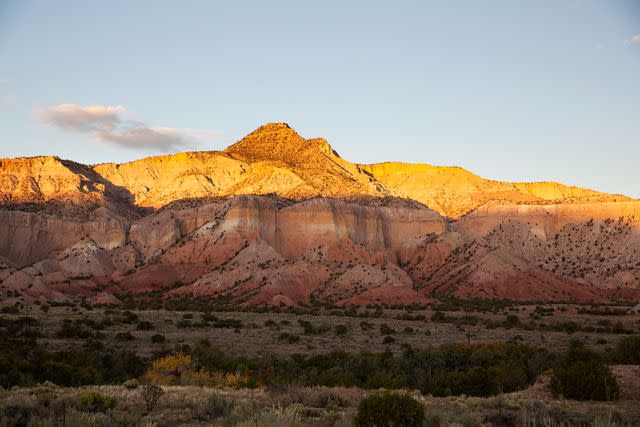
Mary Robnett/Travel + Leisure
“Abiquiú is one of my favorite small towns to take our guests,” says Murray. The town, which was settled by the Spanish in the mid-18th century, looks and feels like it was plucked out of a classic Western, and visitors may even recognize it from fan-favorite flicks like Indiana Jones. However, it’s also famous for being the home of renowned American artist Georgia O'Keeffe. Don’t leave without visiting the O’Keeffe Home and Studio and Ghost Ranch (the artist’s summer home, about 20 minutes northwest). Murray also recommends popping into the state’s first general store, Bodes, which “offers an otherworldly experience for the intrepid traveler,” according to Murray.
Bandelier National Monument
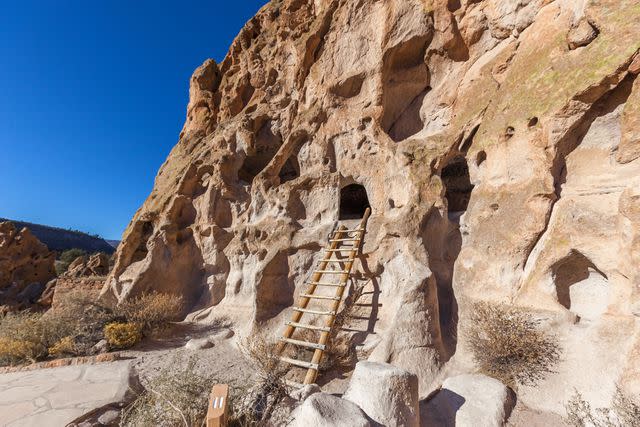
JHVEPhoto/Getty Images
Known for its magnificent mesas, canyons, and ancestral Pueblo dwellings, this national monument spans more than 33,000 acres of rugged landscape, making it a must-visit for history buffs and nature lovers alike. The 1.4-mile Pueblo Loop Trail winds through various archaeological sites and is a popular hike. If you’re looking for more thrills, hop on one of the ladders along the route to climb into small human-carved alcoves. Alternatively, experienced hikers may opt to tackle the challenging Frijoles Canyon and Rim Trail (eight miles one way). Keep in mind those who wish to visit Frijoles Canyon and the Pueblo Loop Trail will be required to take a shuttle, which runs from 9 a.m. to 3 p.m. daily (mid-June through mid-October).
Indian Pueblo Cultural Center
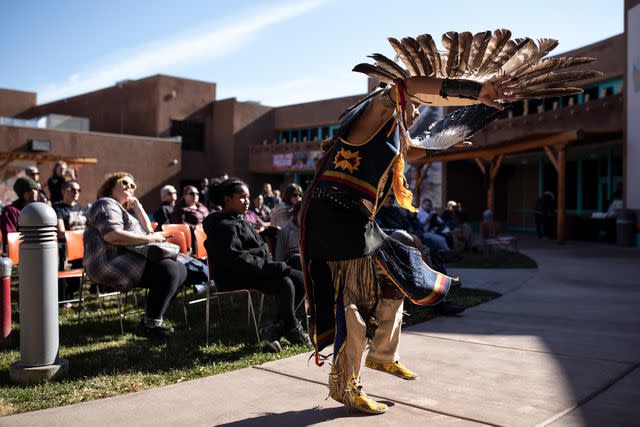
The Washington Post via Getty Images
For a first-hand look at Pueblo culture, head to the Indian Pueblo Cultural Center in Albuquerque. Spanning more than 80 acres, the center is owned and operated by the 19 Pueblos of New Mexico. On-site offerings include a museum, exhibition galleries, murals from Pueblo artists, and the Indian Pueblo Kitchen, which serves freshly prepared Native American cuisine. Don’t leave without stocking up on some souvenirs, including Native American artwork and a wide selection of traditional and contemporary crafts, jewelry, pottery, rugs, and more. Pro tip: Check the events calendar for a schedule of the latest programming.
Santuario de Chimayo
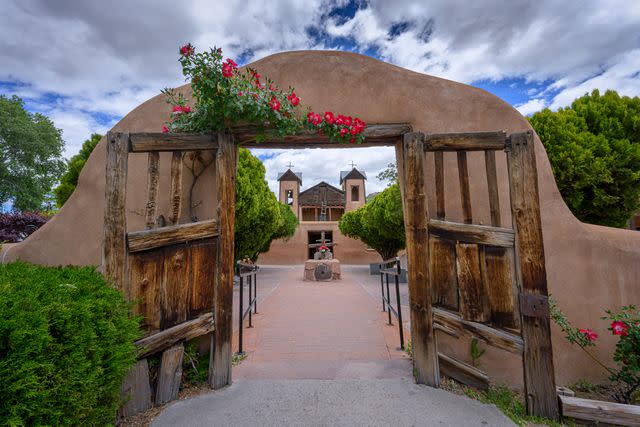
Diana Robinson Photography/Getty Images
Marama Nengel, chef concierge at Bishop’s Lodge, Auberge Resorts Collection, recommends taking an afternoon trip to Santuario de Chimayó, about 27 miles from Santa Fe. According to Nengel, thousands visit this picturesque adobe church — now a National Historic Landmark — each year. It’s best known for its holy dirt, which is believed to have healing properties. Per Nengel, no trip here is complete without a visit to the Centinela Traditional Arts gallery to see eight generations of Trujillo weavers. Finally, when hunger calls, tuck into some Southwestern fare at Rancho de Chimayó.
Puye Cliff Dwellings
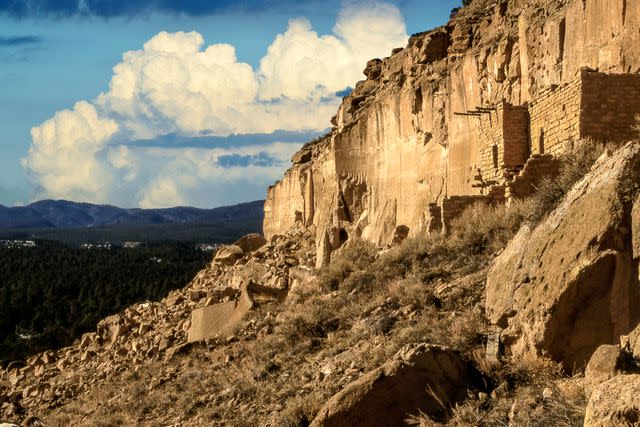
CampPhoto/Getty Images
Located in Los Alamos, this National Historic Landmark was once home to 1,500 Pueblo Indians. It’s no surprise, then, that the site boasts some stunning Pueblo architecture and well-preserved cliff and cave dwellings. The panoramic valley views are an incredible added bonus. It’s worth noting that guided tours are available Monday to Thursday between 9 a.m. and 5 p.m.
Santa Fe Plaza
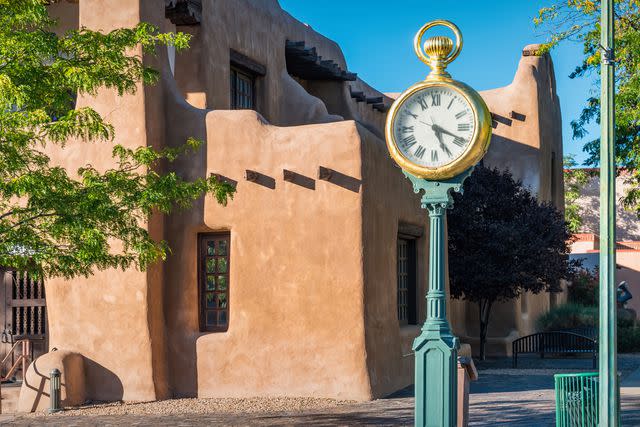
benedek/Getty Images
Santa Fe Plaza is both a beloved tourist attraction and a popular gathering place for locals. This National Historic Landmark, established by the Spanish in the early 17th century, is renowned for its Spanish Pueblo architecture. The bustling location hosts a slew of events throughout the year, including the Traditional Spanish Market in the summer months. Come holiday season, the square gets decked out in twinkling lights, making it even more magical. In recent years, the area surrounding the Plaza has evolved into a buzzy hot spot with dozens of eclectic restaurants, shops, museums, and hotels.
El Rancho de Las Golondrinas
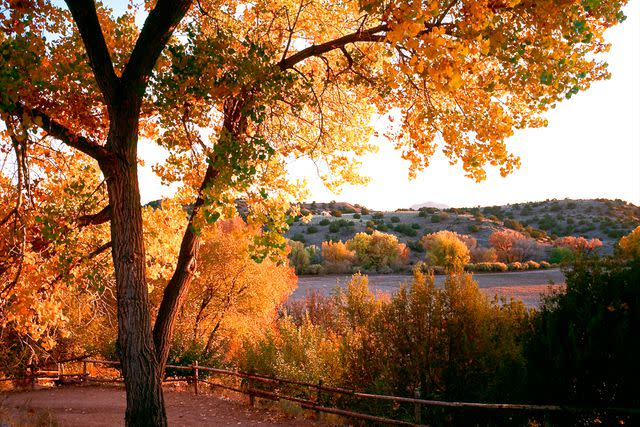
Education Images/Universal Images Group via Getty Images
El Rancho de Las Golondrinas (“The Ranch of the Swallows”) is a historic ranch-turned-living history museum near downtown Santa Fe, though its rural surroundings make it feel worlds away, What’s more, a visit to this 200-acre site, which is dotted with striking adobe buildings, feels like a step back in time to New Mexico in the 1800s. In the 18th and 19th centuries, the ranch served as an official rest stop for travelers on El Camino Real, which stretched from Mexico City to Santa Fe. Note the site is closed for general admission between November and March.
Turquoise Trail National Scenic Byway
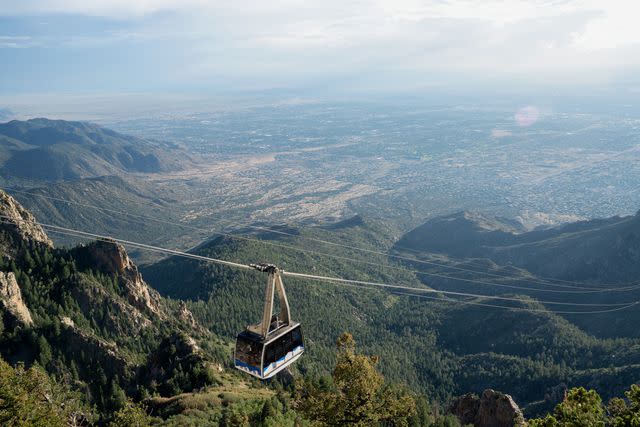
grandriver/Getty Images
The 65-mile Turquoise Trail National Scenic Byway — named for the precious stone the Pueblo mined here centuries earlier — links Santa Fe and Albuquerque. As such, it makes for an excellent day trip from either city. The historic route winds through old mining and ghost towns such as Madrid, Golden, and Los Cerrillos. Carve out some time to stop at Casa Grande Trading Post, Cowgirl Red, and Tinkertown Museum, as well as Sandia Peak Tramway to soak up the postcard-worthy views from up high.
Sangre de Cristo Mountains
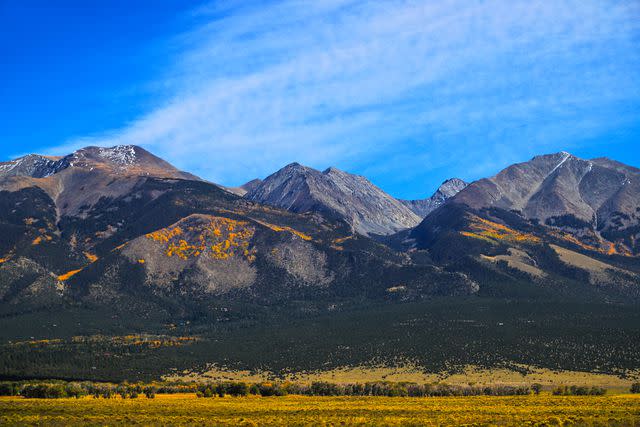
Daniela Duncan/Getty Images
According to Hans Loehr, adventure center architect at the Four Seasons Resort Rancho Encantado Santa Fe, the Sangre de Cristo Mountains offer something for everyone, including scenic trails for hikers of all experience levels. Additionally, he tells Travel + Leisure, "Guests can enjoy exploring forests of aspen, ponderosa, and pinyon-juniper and meadows filled with colorful wildflowers, relaxing near alpine lakes, bagging some high mountain peaks, and pausing to take in breathtaking views from ridgetops and mountain summits.”
Rio Grande Gorge
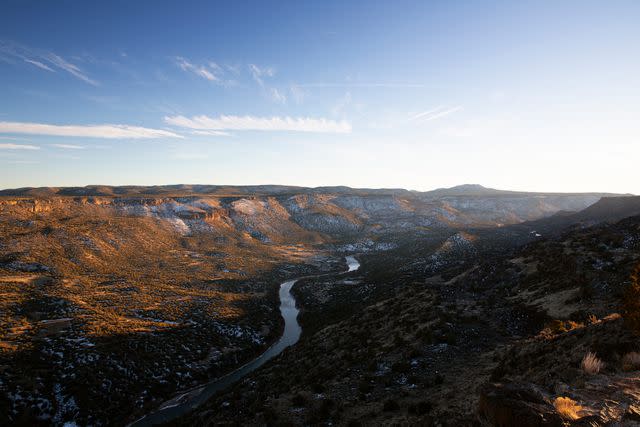
Mary Robnett/Travel + Leisure
Stretching nearly 50 miles, the magnificent, 800-foot-deep Rio Grande Gorge is considered the Grand Canyon of New Mexico. Soak in sweeping views of the rugged landscape from the Rio Grande Gorge Bridge, which, at 650 feet above the ground, is one of the country’s highest bridges. It’s also a popular spot for hiking.
Meow Wolf

Courtesy of Meow Wolf
Sontanna Sanchez, a concierge at the Four Seasons Resort Rancho Encantado Santa Fe, recommends visiting Meow Wolf for a unique and immersive art experience. The kaleidoscopic “House of Eternal Return” features “more than 70 rooms, taking participants on a macrocosmic adventure only found in Santa Fe,” says Sanchez. All in all, the playful exhibit is sure to delight art lovers of all ages.
San Miguel Chapel
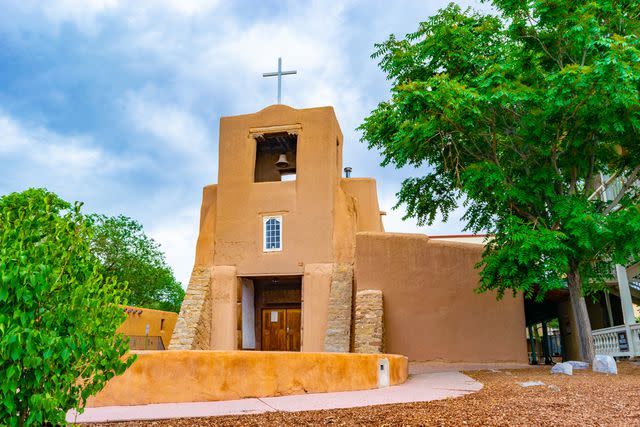
Michael Warren/Getty Images
Located along the Old Santa Fe Trail in Santa Fe’s Barrio de Analco Historic District, this Spanish colonial mission church is considered the oldest in the United States. While initially constructed in 1610, it has since been rebuilt twice (most recently in 1710). In terms of design, prepare to be dazzled by the adobe architecture; the interiors are equally spectacular with centuries-old wooden beams and the 750-plus-pound San Jose bell, which has its own fascinating history.
Carlsbad Caverns National Park
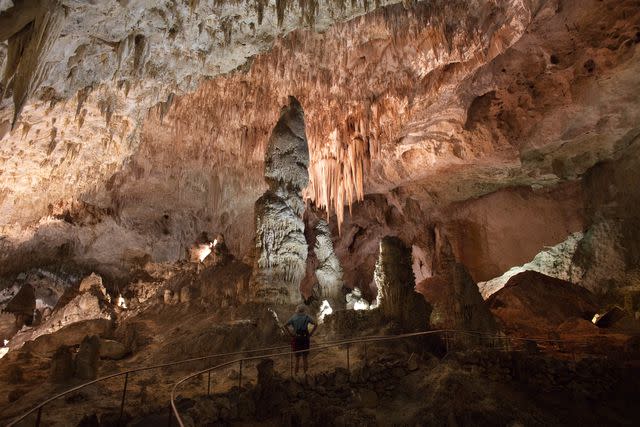
milehightraveler/Getty Images
This national park and UNESCO World Heritage Site is located in the Chihuahuan Desert in the southern part of the state. The enchanting attraction is home to nearly 120 caves. Travelers can easily spend the entire day exploring these captivating caverns, admiring the mystical stalagmites and stalactites, and spotting wildlife like bats and cougars. Don’t miss the Big Room, North America’s largest single cave chamber by volume. The 1.25-mile trail is a relatively easy 90-minute trek.
Old Town Albuquerque
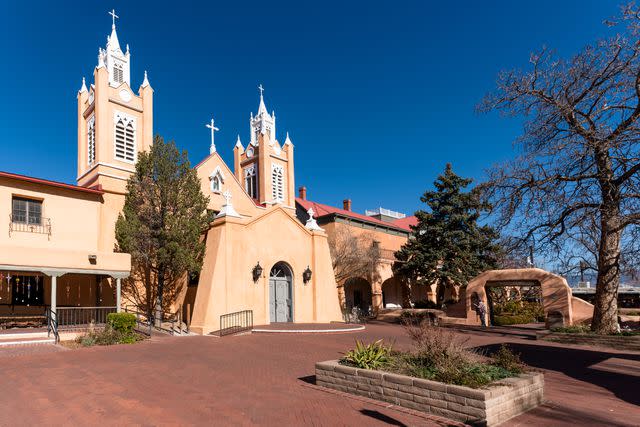
Alex Potemkin/Getty Images
With its narrow winding streets and adobe architecture, Old Town Albuquerque oozes small-town charm. While lots has changed since its 1706 establishment, this dynamic destination has remained the city's heart. Despite its tiny 10-block radius, Old Town is packed with more than 150 independent restaurants and boutiques. It also hosts more than 40 events annually, including a car show, live music performances, and the world-famous Balloon Fiesta Week.
Taos Downtown Historic District
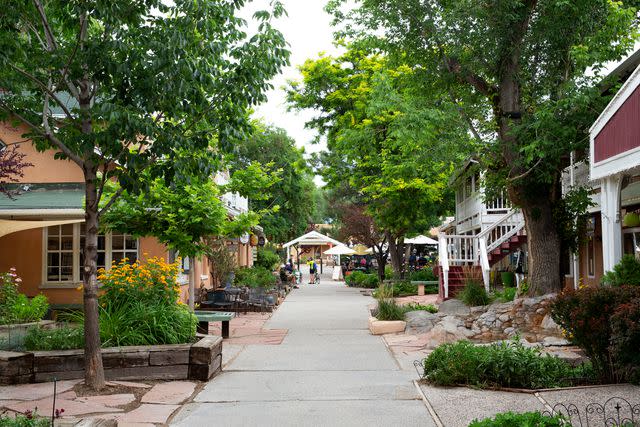
Mary Robnett/Travel + Leisure
Despite its small size, Taos packs in plenty of charm and character. What’s more, this storied mountain town is renowned for its many galleries, scenic hiking trails, and, in the winter, world-class skiing. At the center of town is the Downtown Historic District, where you’ll find the 1796-era Taos Plaza. Here, locals and visitors alike gather to listen to live music and attend farmers markets and other events, including dozens of art-forward programming. An abundance of shops and galleries can also be found within easy walking distance. When it's time to refuel, head to one of the nearby cafes and restaurants.
Taos Pueblo
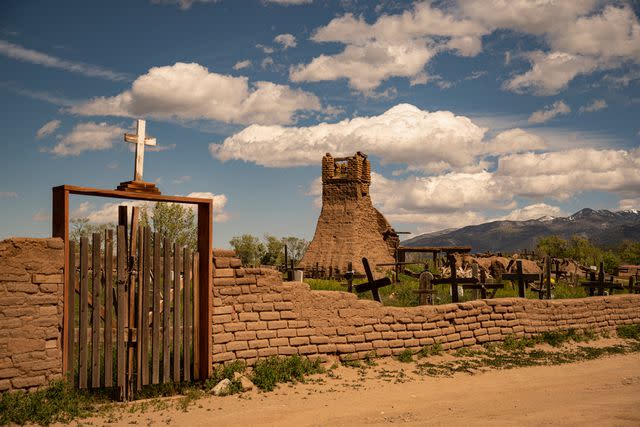
Kathleen Messmer/Travel + Leisure
About three miles northwest of Taos Plaza lies the Taos Pueblo, which is both a UNESCO World Heritage Site and a National Historic Landmark. The Pueblo has been inhabited for more than a millennium, and many of the adobe structures appear the same as when the Spanish first arrived in New Mexico in the 1500s. Hlauuma (north house) and Hlaukwima (south house) are the location's most famous buildings, and they’re considered the oldest continuously inhabited communities in the country.
For more Travel & Leisure news, make sure to sign up for our newsletter!
Read the original article on Travel & Leisure.

